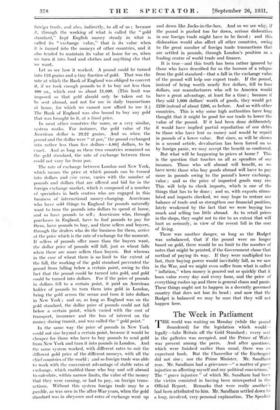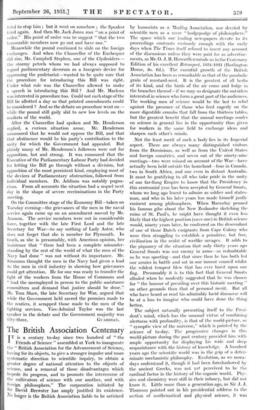The Week in Parliament
r 1HE world was waiting on Monday (while the pound floundered) for the legislation which would- legally—take Britain off the Gold Standard ; every seat in the galleries was occupied, and the Prince of Wales was present among the peers. And after questions, which were finished earlier than usual, there was an expectant hush. But the Chancellor of the Exchequer did not rise ; nor the Prime Minister. Mr. Sandhani rose. Mr. Sandham had a grievanCe—" a matter of grave injustice as affecting myself and my political convictions." The " grave injustice " of which Mr. Sandham had been the victim consisted in having been misreported in the Official Report. Remarks that were really another's had been attributed to him. Mr. Sandham settled down to a long, involved, very personal explanation. The Speaker tried to stop him ; but it went on somehow ; the Speaker tried again. And then Mr. Jack Jones rose "on a point of order." His point of order was to suggest " that the two honourable members now go out and have one."
Meanwhile the pound continued to slide on the foreign exchanges. And when the Chancellor of the Exchequer did rise, Mr. Campbell Stephen, one of the Clydesiders- the stormy petrels whom we had always supposed to regard parliamentary decorum as a bourgeois device for oppressing the proletariat—wanted to be quite sure that the procedure for introducing this Bill was right. Under what rule was the Chancellor allowed to make a speech in introducing this Bill ? And Mr. Maclean was interested in procedure too. Could not each stage of the Bill be allotted a day so that printed amendments could be considered ? And so the debate on procedure went on— while the pound still gaily slid to new low levels on the markets of the world.
After the Chancellor had spoken and Mr. Henderson replied, a curious situation arose. Mr. Henderson announced that he would not oppose the Bill, and that that abstinence would be his party's contribution to the unity for which the Government had appealed. But plainly many of Mr. Henderson's followers were out for opposition, hot and strong. It was rumoured that the Executive of the Parliamentary Labour Party had decided for letting the Bill go through without a division, but opposition of the most persistent kind, employing most of the devices of Parliamentary obstruction, followed from individual members. Dr. Addison was notably pugna- cious. From all accounts the situation had a sequel next day in the shape of severe recriminations in the Party meeting.
On the Committee stage of the Economy Bill—taken on Tuesday evening—the grievances of the men in the naval service again came up on an amendment moved by Mr. Ammon. The service members were out in considerable force, together with the late First Lord and the late Secretary for War—to say nothing of Lady Astor, who does not forget that she is member for Plymouth. In touch, as she is presumably, with American opinion, her insistence that " there had been a complete misunder- standing by the rest of the world of what the men of the Navy had done " was not without its importance. Mr. Simmons thought the men in the Navy had given a lead to the men in civil industry in showing how grievances could get attention. He for one was ready to transfer the light of the workers from the House of Commons and " lead the unemployed in person to the public assistance committees and demand that justice should be done." Mr. Tom Shaw, the late Secretary for War, argued that while the Government held sacred the promises made to the rentiers, it scrapped those made to the men of the fighting services. Vice-Admiral Taylor was the last speaker in the debate and the Government majority was



































 Previous page
Previous page